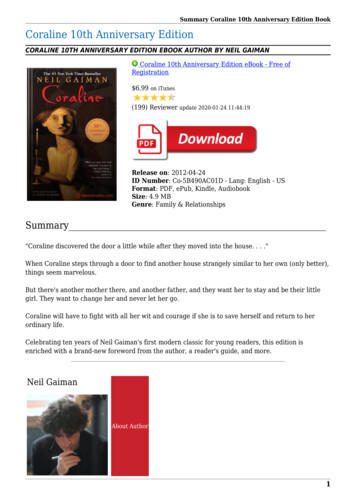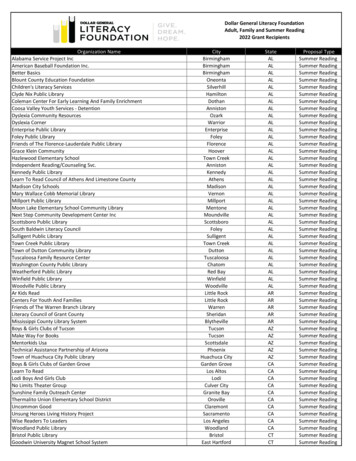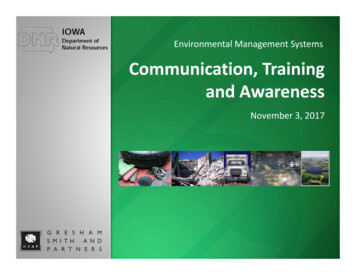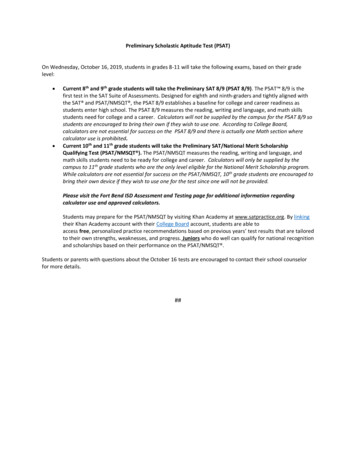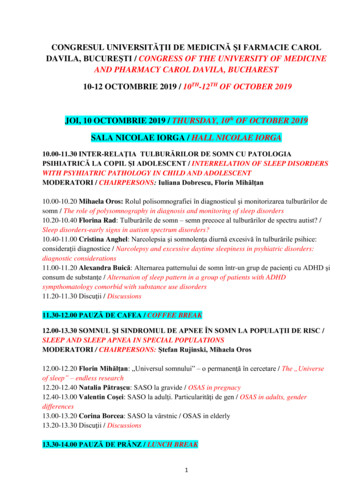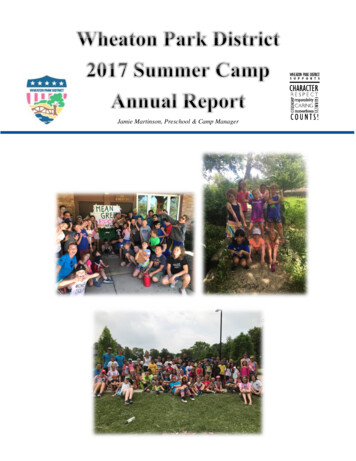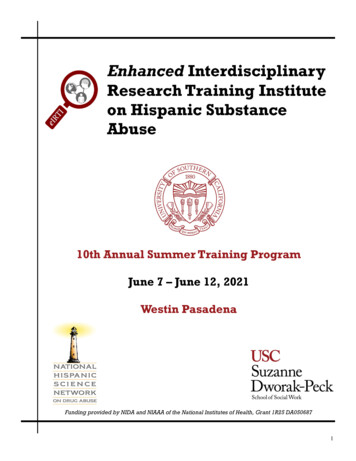
Transcription
10th Annual Summer Training ProgramJune 7 – June 12, 2021Westin PasadenaFunding provided by NIDA and NIAAA of the National Institutes of Health, Grant 1R25 DA0506871
Day One - Monday June 7Location— Plaza Room:9:00 - 10:00 amRegistration and Breakfast10:00 - 11:00 amWelcome and IntroductionAvelardo Valdez, PhD, eIRTI DirectorUniversity of Southern CaliforniaAlice Cepeda, PhD, eIRTI Co-DirectorUniversity of Southern CaliforniaSarah Gehlert, PhD, Dean of the School of Social WorkUniversity of Southern CaliforniaErika Smith, MBA, MPH, eIRTI Program ManagerUniversity of Southern CaliforniaIntroduction of 2021 eIRTI Faculty & Fellows11:00 - 12:00 pm2021 IRTI Fellows Brief Research Proposal Pitches12:00 - 1:00 pmLunch1:00 - 3:00 pmConceptualizing a Successful NIH Grant Application: SpecificAims, Significance and Innovation [Workshop]Guillermo Prado, PhD, University of Miami3:00 - 3:15 pmBreak3:15 - 5:00 pmApproaches and Tools for Reviewing and Wrangling the Literature[Workshop]Danielle C. Ompad, PhD, New York University2
Day Two- Tuesday June 89:00 - 10:45 amResearch Integrity, Research Ethics, and Collegial Ethics: SomeThoughts on Responsibilities for Scientist-Citizens [Workshop]James Anthony, PhD, Michigan State University10:45 - 11:00 amBreak11:00 –12:45 pmThe Art of Innovation [Critical Dialogue]Moderator: Bryan Page, PhD, University of MiamiCarlos Bolaños, PhD, Texas A&M UniversityStephen Lankenau, PhD, Drexel UniversityPatricia Molina, PhD, Louisiana State UniversityAvelardo Valdez, PhD, University of Southern California12:45 -1:45 pmLunch1:45 - 3:15 pmIndividualized Real-Time Research, Writing, & MentoringSession 1 (see pg. 7 for list of mentors)3:15 - 5:00 pmCOVID-19’s Impact on Health Inequities Today andBeyond: Research Implications [Panel]Moderator: Felipe Gonzalez Castro, PhD, Arizona State UniversityPandemics and Prisons: COVID-19 Behind BarsKathryn Nowotny, PhD, University of Miami, 2012 IRTI CohortBig Events Theory and Measures May Help Explain EmergingLong- Term Effects of Current CrisesSamuel Friedman, PhD, New York University5:30 - 7:00 pm2021 eIRTI Networking and Mentoring ReceptionLocation: Ventanas Restaurant Patio3
Day Three - Wednesday June 99:00 - 10:00 amIntroduction: Avelardo Valdez, PhDNIH Funding Opportunities & Discussion of Grant ResubmissionApproachesAlbert Avila, PhD, National Institute on Drug Abuse10:00 - 10:15 amBreak10:15 - 12:15 pmUnderstanding Substance Abuse Through a Neuroscience andBehavioral Lens [Panel]Moderator: Laura O’Dell, PhD, University of Texas at El PasoFunctional Consequences of Methyphenidate (Ritalin) ExposureEarly in Development: Insights from Preclinical StudiesArturo Zavala, PhD, California State University, Long BeachFrontocortical Mechanisms of Flexible Reward Learning and ValueBased ChoiceAlicia Izquierdo, PhD, University of California Los Angeles12:15 - 1:15 pmLunch1:15 - 2:45 pmIndividualized Real-Time Research, Writing, and MentoringSession 2 (see pg. 7 for list of mentors)2:45 - 3:00 pmBreak3:00 - 5:00 pmIn the Field: Conducting Mixed-Methods Research with VulnerablePopulations [Panel]Moderator: Charlie Kaplan, PhD, University of Southern California(retired)Identifying, Building Trust and Recruiting Hard to Reach Drug UsingPopulations: Reflections on a Longitudinal Study of Mexican AmericanFemalesAlice Cepeda, PhD, University of Southern CaliforniaEsmeralda Ramirez, MA, University of Southern CaliforniaPre-Exposure Prophylaxis for HIV Prevention Among People WhoInject Drugs in a Fentanyl Market: A Mixed Methods HIV PreventionResearch AgendaAngela Bazzi, PhD, University of California San Diego, 2010 IRTI Cohort4
Day Four - Thursday June 109:30-10:00 am10:00 - 12:00 pmFinal Research Prospectus PresentationAnel Jaramillo, PhD, Vanderbilt UniversityUnderstanding the Effects of Nicotine and Alcohol: From Psychosocial Factors toNeurobiological Mechanisms [Panel]Moderator: Edward Castañeda, PhD, University of Texas at El PasoScience as a Platform for Promoting Diversity and Understanding Nicotine Use inVulnerable PopulationsLaura O’Dell, PhD, University of Texas El PasoAlcohol Use and Treatment Disparities among LatinosMiguel Pinedo PhD, University of Texas Austin, 2016 IRTI Cohort12:00 - 1:00 pmLunch1:00 - 2:45 pmIndividualized Real-Time Research, Writing, and MentoringSession 3 (see pg. 7 for list of mentors)2:45 - 3:00 pmBreak3:00 - 5:00 pmUnpacking the Complexity of the Social Determinants of Drug Use [Panel]Moderator: Avelardo Valdez, PhD, University of Southern CaliforniaBeyond Opioids: Stimulants and the 4th Wave of the Overdose CrisisDaniel Ciccarone, PhD, University of California San FranciscoThe Complex Interaction Between Neighborhood Disadvantage,Decision-Making, and Cannabis Use PatternsCatalina Lopez-Quintero, MD, MPH, PhD, University of Florida, 2013 IRTI CohortReminders: Fellow’s Research Prospectus must be submittedto erikague@usc.edu by 5:00 pm tomorrow.Day Five - Friday June 11 is an Individualized Workday.5
Day Six - Saturday June 12Final Research Prospectus PresentationsReviewers:Edward Castañeda, PhD, University of Texas at El PasoFelipe Gonzalez Castro, PhD, Arizona State UniversityAlice Cepeda, PhD, University of Southern CaliforniaKathryn Nowotny, PhD, University of MiamiLaura O’Dell, PhD, University of Texas at El PasoMiguel Pinedo, PhD, University of Texas at AustinJ. Bryan Page, PhD, University of MiamiAvelardo Valdez, PhD, University of Southern California9:00 - 9:30 am9:30 - 10:00 am10:00 - 10:30 amAdelis Cruz, BS, Texas A & M UniversitySaul Alamilla, PhD, Kennesaw UniversityMercedes Hernandez, PhD, University of Texas, Austin10:30 - 10:45 amBreak10:45 - 11:15 am11:15 - 11:45 amMarilyn Horta, PhD, University of FloridaMaria Jacotte, PhD, Louisiana State University11:45 - 12:15 pm12:15 - 1:00 pmeIRTI Fellows: Next Steps and ExpectationsAvelardo Valdez, PhD, University of Southern CaliforniaAlice Cepeda, PhD, University of Southern CaliforniaErika Smith, MBA, MPH, University of Southern CaliforniaFarewell Lunch6
Session MentorsSession 1 (Tuesday, June 8th)Carlos Bolaños, PhD, Texas A&M UniversityEdward Castañeda, PhD, University of Texas at El Paso*Felipe Gonzalez Castro, PhD, Arizona State University*Alice Cepeda, PhD, University of Southern California*Patricia Molina, PhD, Louisiana State UniversityKathryn Nowotny, PhD, University of MiamiLaura O’Dell, PhD, University of Texas at El Paso*Danielle Ompad, PhD, New York UniversityJ. Bryan Page, PhD, University of Miami*Avelardo Valdez, PhD, University of Southern California*Session 2 (Wednesday, June 9th)eIRTI Advisory BoardAngela Bazzi, PhD, University of California, San DiegoAlicia Izquierdo, PhD, University of California Los AngelesDanielle Ompad, PhD, New York UniversityKathryn Nowotny, PhD, University of MiamiMiguel Pinedo, PhD, University of Texas at AustinArturo Zavala, PhD, California State University, Long BeachSession 3 (Thursday, June 10th)eIRTI Advisory BoardAngela Bazzi, PhD, University of California, San DiegoDaniel Ciccarone, PhD, University of California San FranciscoKathryn Nowotny, PhD, University of MiamiMiguel Pinedo, PhD, University of Texas at AustinArturo Zavala, PhD, California State University, Long Beach*Denotes IRTI Advisory Board Member7
NHSN Mission StatementThe National Hispanic Science Network on Drug Abuse is dedicated to improving the health of Hispanics by increasing the amount and quality of interdisciplinary translational research on drug abuse,and fostering the development of Hispanic scientists in drug abuse research.National Steering CommitteePatricia E. Molina, MD, PhDNHSN Co-ChairRichard Ashman Professor & HeadDepartment of PhysiologyDirector, Alcohol & Drug Abuse CenterLouisiana State University Health Sciences Center1901 Perdido StreetNew Orleans, LA 70112(504) 568-6187 – phone(504) 568-6158 – faxpmolin@lsuhsc.eduAvelardo Valdez, PhDNHSN Co-ChairCleofas and Victor Ramirez Professor ofPractice, Policy, Research and Advocacy forthe Latino PopulationSuzanne Dworak-Peck School of Social WorkUniversity of Southern California669 W. 34th StreetLos Angeles, CA 90015(213) 821-6482 – phoneavelardv@usc.eduMargarita Alegría, PhDProfessorChief, Disparities Research UnitHarvard Medical School120 Beacon Street, 4th FloorSomerville, MA 02143(617) 503-8447 – phone(617) 503-8430 – faxmalegria@charesearch.orgJames Anthony, PhDProfessorDepartment of EpidemiologyMichigan State UniversityB601 West Fee HallEast Lansing, MI 48824(517) 353-8623 - phonejanthony@msu.eduCarlos Bolaños-Guzmán, PhDAssociate ProfessorDepartment of PsychologyTexas A&MPsychology Bldg. Room 286College Station, TX 77843(979) 845-2581 – phonebolanos-guzman@tamu.eduMiguel Ángel Cano, PhD, MPH, MSAssistant Professor and Director ofEpidemology Doctoral ProgramDepartment of EpidemiologyRobert Stempel College ofPublic Health and Social WorkFlorida International University112000 Southwest 8th St. AHC 5-488Miami, FL 33199Office: (305) 348-8586mcanojr@fiu.eduAlice Cepeda, PhDAssociate ProfessorSuzanne Dworak-Peck School of Social WorkUniversity of Southern California669 W. 34th StreetLos Angeles, CA 90015(213) 821-6464 – phonealicecep@usc.eduFelipe Gonzalez Castro, PhDProfessorCollege of Nursing & Health InnovationArizona State UniversityHLTH North Rm 331E(602) 496-1720 – phonefelipe.castro@asu.edu8
National Steering Committee (cont.)Flavio Marsiglia, PhDDistinguished Foundation Professor of CulturalDiversity and HealthDirectorSouthwest Interdisciplinary Research CenterSchool of Social WorkArizona State University411 N. Central Ave., Suite 720Phoenix, AZ 85004(602) 496-0700 – phone(602) 496-0958 – faxmarsiglia@asu.eduLaura Elena O’Dell, PhDProfessorDepartment of PsychologyUniversity of Texas, El Paso500 W. University AvenueEl Paso, TX 79968(915) 747-6557 – phone(915) 747-6553 – faxlodell@utep.eduArturo Zavala, PhDAssociate ProfessorDepartment of Psychology, PSY 429California State University, Long Beach1250 Bellflower Blvd.Long Beach, California 90840Office: (562) 985-2077arturo.zavala@csulb.eduEARLY CAREER LEADERSHIP CHAIRLuis, Natividad, PhDPostdoctoral Research AssociateThe Scripps Research InstituteDepartment of Neuroscience10550 North Torrey Pines Road(Mailcode: SP30-2003)La Jolla, CA 92037(858) 784-7071 – phone(858) 784-7405 – faxlnativi@scripps.edu9
Support for this TrainingFunding for this training was made possible through a training grant entitled,“Interdisciplinary Research Training Institute on Hispanic Drug Abuse” (2R25 DA026401,PI: Avelardo Valdez) to the University of Southern California from the National Institutes ofHealth, National Institute on Drug Abuse and the support of the National Hispanic ScienceNetwork on Drug Abuse.USC Suzanne Dworak-Peck School of Social WorkUniversity of Southern California669 West 34th St.Los Angeles, CA 90089-0411Tel: 213.821.7657www.sowkweb.usc.eduNational Hispanic Science Network on Drug Abusewww.the-NHSN.orgNIDANATIONAL INSTITUTEON DRUG ABUSE10
NATIONAL HISPANICSCIENCE NETWORKON DRUG ABUSE21st Annual International ConferenceLooking Back to Look Ahead: Rediscoveringand Expanding the Foundations of SubstanceUse Research with Diverse Populations as weEnter a Post-Pandemic WorldSeptember 22-24, 2021Grand Rapids, MIwww.the-nhsn.org11
Abstracts12
AbstractsMONDAY JUNE 7, 20211:00pm—3:00pmCONCEPTUALIZING A SUCCESSFUL NIHGRANT APPLICATION: SPECIFIC AIMS,SIGNIFICANCE, AND INNOVATION[WORKSHOP]Guillermo PradoThis interactive workshop will focus on how tosuccessfully conceptualize and write thespecific aims, significance, and innovationsections of a NIH grant application. The "do'sand don'ts" of what to include in each of thesesections of a grant application will bediscussed. Examples of successful specificaims, significance, and innovation sections ofgrants will be contrasted with those whichwere not successful.3:15pm—5:00pmAPPROACHES AND TOOLS FORREVIEWING AND WRANGLING THELITERATURE [WORKSHOP]Danielle OmpadThis workshop will introduce approaches tosystemically searching the peer-reviewedliterature using several databases and Booleanoperators. Strategies for wrangling the searchresults will be discussed. Several types ofliterature reviews will be described includingnarrative reviews, systematic reviews, andmeta analyses.Finally, several tools forconducting literature reviews including thePRISM statement, PROSPERO, and Covidencewill be demonstrated.TUESDAY JUNE 8, CS, AND COLLEGIAL ETHICS: SOMETHOUGHTS ON RESPONSIBILITIES FORSCIENTIST-CITIZENS [WORKSHOP]James AnthonyThis workshop will start by challenging thefellows to think about macro-level issues where'scientist-citizens of the world' haveresponsibilities in the domain of public policy.Case studies that involve research integrityand ethics will be examined, as well asprotection of human subjects in research.Attention will be given to the topic of collegialethics, and issues of authorships and coauthorships. Dogma in these matters will not beoffered. Instead, the fellows should be able toreturn to their home institutions and begin toassemble a research integrity and ethicsportfolio for them to use in their own researchand academic environment.11:00am—12:45pmTHE ART OF INNOVATION [CRITICALDIALOGUE]Moderator: Bryan PageCarlos Bolaños, Stephen Lankenau, PatriciaMolina, Avelardo ValdezThis panel focuses on the Innovation section ofa NIH grant application, with a focus on grantsubmissions. Building on their ownexperiences as scientists and grant reviewers,the panel will discuss the need for proposals toaddress questions that shift current researchand clinical paradigms. The central role thatsystematic literature searches, investigators’prior research projects, and pilot researchresults play in shaping the content andinnovation of a grant application will bediscussed. The panel will discuss howrecognizing the gaps in the scientific literatureshould be translated into innovative HEALTHINEQUITIES TODAY AND BEYOND:RESEARCH IMPLICATIONS [PANEL]Moderator: Felipe Gonzalez CastroAlthough there has been widespread coverageof the consequences of COVID-19’s impact onthe general population, less attention has been13
AbstractsTUESDAY JUNE 8, 2021(cont.) given to its impact on sociallydisadvantaged groups. As data on thepandemic emerges it is becoming clear that amajor consequence has been increased socialand health disparities among those living onthe social margins of our society. Thepresentations will enhance our understandingof the pandemics impact on sociallydisadvantaged groups (comprised largely ofBlacks and Latinos) and provide insights intothe less understood long-term effects ofthis public health crisis in society.PANDEMICS AND PRISONS: COVID-19BEHIND BARSKathryn NowotnyThis talk will review the devastating toll of theCOVID-19 pandemic in U.S. correctionalfacilities across the country, including localjails, state and federal prisons, and ICEdetention centers. Drawing from over a year ofdata collection and advocacy with the COVIDPrison Project, Dr. Nowotny will situate massincarceration as a social structural driver ofhealth inequities, examine the epidemiology ofCOVID-19 behind bars, and discuss ongoingattempts to ameliorate harm.“BIG EVENTS”: LONG-TERM EFFECTS OFTHE COVID-19, RACISM AND ECONOMICCRISES ON BEHAVIOR & INFECTIOUSDISEASESSamuel FriedmanBig Events are periods during which abnormallarge-scale events like war, economiccollapse, revolts, or pandemics disrupt dailylives and expectations about the future. Theycan lead to rapid change in health-relatednorms, beliefs, social networks and behavioralpractices. The world is undergoing such BigEvents through the interaction of COVID-19, alarge economic downturn, massive socialunrest in many countries, and ever-worseningeffects of global climate change. Previousresearch, mainly on HIV/AIDS, suggests thatthe health effects of Big Events can beprofound, but are contingent: Sometimes BigEvents led to enormous outbreaks of HIV andassociated diseases and conditions such asinjection drug use, sex trading, andtuberculosis, but in other circumstances, BigEvents did not do so. The current Big Events inthe United States have already seen 2020 tohave the largest number of overdose deaths inthecountry’shistory—87,000.This presentation will discuss hypothesesabout pathways through which the current BigEvents might lead to better or worse short andlongtermoutcomesforvarioushealth conditions and diseases; considers howpre- existingsocietalconditionsandchanging “pathway” variables can influencethe impact of Big Events; discusses how tomeasure these pathways; and suggestsways research and surveillance might beconducted to improve human capacity toprevent or mitigate the effects of Big Eventson human health.WEDNESDAY JUNE 9, SION OF GRANTRESUBMISSION APPROACHESAlbert AvilaThispresentationwilldiscussdifferent mechanisms for NIH and toral researchers, andjunior faculty who have not yet beenawarded a NIH research (R) series grant.Attention will be paid to first-timefunding strategies as well as approachesfor successful grant resubmission.14
AbstractsWEDNESDAY JUNE 9, derator: Laura O’DellThe panel will present and criticallyreview preclinical studies with rats andtheir translational relevance to sms. The discussion will touch onhow animal models may be the precursor tothe development of psychiatric medicationsand assist in the development of treatment ofpersons with substance use disorders.FUNCTIONALCONSEQUENCESOFMETHYPHENIDATE (RITALIN)EXPOSURE EARLY IN DEVELOPMENT:INSIGHTS FROM PRECLINICAL STUDIESArturo cmedicationinchildren. Yet, little research has examinedthe effects of the early and extended use ofthis drug when it is prescribedtopreschoolagechildren. Preclinicalstudies demonstrated that the early exposureto methylphenidate in rats, during a periodof development similar to preschool agechildren, alters the rewarding effects ofcocaine when rats are tested as adults.Dr. Zavala will present data from animalstudies that demonstrate that the effectsof early exposure to methylphenidate alsoaffect the rewarding effects of nicotine inadolescent male and female rats. The findingsfrom these studies have significant clinicalimplications for the use of methylphenidatein preschool age children.FRONTOCORTICAL MECHANISMS OFFLEXIBLE REWARD LEARNING &VALUE-BASED CHOICEAlicia IzquierdoOrbitofrontal cortex (OFC) and Anteriorcingulate cortex (ACC) have beenassigned various overlapping rolesranging from learning and responding toreward, signaling value and uncertainty,and supporting economic decisions, toname a few. Both of these regions sharereciprocal anatomical connections withbasolateral amygdala, and not surprisingly,there is a great deal of functional similarityamong these circuits.In this presentation,Dr. Izquierdo will present data comparingOFC and ACC, together with basolateralamygdala, in flexible reward learning.Results suggest highly overlapping, lessspecialized, roles for ACC and OFC inlearning that point to complementary roles inkeeping track of outcomes over repeatedexperience. More recent data will bediscussed with an eye toward similarities inACC and OFC function across cognitivedomains. Collectively these findings haveimplications for how we view frontocorticalcontributions to flexible learning and valuebased decision making across rodent andprimate species, and may initiate a(re)evaluation of their roles in substance usedisorders and disorders of maladaptivedecision making.3:00pm—5:00pmIN THE FIELD: CONDUCTING MIXEDMETHODS RESEARCH WITH VULNERABLEPOPULATIONSModerator: Charles KaplanThis panel will focus on the importance ofmixed methods in understanding healthdisparities among vulnerable drug usingpopulations. A limitation with drugbased research using quantitative orsecondary analyses is the focus oninstitutionalized samples (i.e. school-basedstudies, household15
AbstractsWEDNESDAY JUNE 9, 2021(cont.) surveys, drug treatment, etc.) that raiseissues associated with selection bias and socialdesirability. The objective of this panel is toprovidefellowswithanin-depthunderstanding of the day-to-day lives of streetor community-based samples who gounderrepresented in national surveillancesystems. This panel will take advantage of thefirst-hand experiences of two research teamsthat span epidemiological and interventionstudies.IDENTIFYING, BUILDING TRUST, ANDRECRUITING HARD TO REACH DRUGUSING POPULATIONS: REFLECTIONS ONA LONGITUDINAL STUDY OF MEXICANAMERICAN FEMALESAlice Cepeda and Esme RamirezDrug use patterns are mediated by a multitudeof biological, social, environmental anddevelopmental factors. Due to the linary scientists need to becognizant of the importance ethnographic andqualitative data generates to obtain insightsinto individual’s daily lives that can contributeto advances in basic science and treatment.The challenge for the research community is ingaining access to hidden populations that arethe least likely to seek out social, treatment andhealth care services. The authors discussmethodological approaches recently utilizedfrom a NIDA funded study with young adultMexican American women in San Antonio . Thesession highlights the importance ofdeveloping relationships with individuals,families and the community that creates trustand rapport. Discussed is how these socialinteractions help us understand how thesewomen experience and perceive challenges intheir everyday lives within a low income andmarginalized context, identify life eventsleading to drug use career trajectories and thecircumstances and behaviors in which drug useoccurs. This session aims to provide a“research nudge” to those who have not beenpreviouslyexposedtoqualitative/ethnographic mixed methods that goes beyondsurvey research and secondary analyses ofdrug use research.PRE-EXPOSURE PROPHYLAXIS FOR HIVPREVENTION AMONG PEOPLE WHOINJECT DRUGS IN A FENTANYL MARKET:A MIXED METHODS HIV PREVENTIONRESEARCH AGENDAAngela BazziThe increasing prevalence of injection druguse has led to several recent HIV outbreaksamong people who inject drugs (PWID) acrossthe United States. Rising quantities of illicitlymanufactured fentanyl within opioid andstimulant drug supplies have exacerbated theoverlapping sexual and injection-relatedbehaviors that increase HIV transmissionamong PWID. Furthermore, access to evidence-based HIV prevention services (includingsterile syringes and medications for opioid usedisorder) remains limited in many geographicareas and was likely adversely impacted by theCOVID-19 pandemic. Unfortunately, nearly adecade after antiretroviral pre-exposureprophylaxis (PrEP) was found to be efficaciousfor HIV prevention among at-risk PWID, PrEPresearch and implementation for sociallymarginalized population lag behind that ofother groups. To fill this research gap, we haveconducted extensive qualitative andquantitative research with PWID across the U.S.Northeast, a region historically and currentlyaffected by opioids, polysubstance use, andrelated health consequences. This presentationwill explore how our preliminary data andcommunity partnerships laid the groundworkfor a multisite intervention trial andimplementation studies to improve PrEPutilization among actively-injecting PWID.16
AbstractsTHURSDAY JUNE 10, 202110:00am—12:00pmUNDERSTANDING THE EFFECTS OFN ICO T IN E&AL CO HO L:FRO MPSYCHOSOCIALFACTORSTON EU RO B IO LO G ICA LM ECH AN ISMS[PANEL]Moderator: Edward CastañedaThis panel will address existing knowledgeabout the effects of alcohol on health and wellbeing from a basic science to anepidemiological and prevention perspective.Panelists will highlight their respective NIAAA /NIDA funded research aimed at generatingadvances in addressing alcohol- and nicotine related disparities. First, the panel willhighlight the underlying factors that promotetobacco use in vulnerable populations focusingon the neurochemical effects of nicotine andwithdrawal through the use of animal models.Second, the panel will highlight the criticalbarriers that are salient among Latinos thatimpact treatment seeking behavior for ERSITYANDUNDERSTANDING NICOTINE USE INVULNERABLE POPULATIONSLaura O’DellDr. O’Dell’s presentation will cover specificresearch questions of interest including: theunderlying factors that promote tobacco use invulnerable populations, such as ms that modulate the neurochemicaleffects of nicotine and withdrawal from thisdrug;biologicalunderpinningsthatpromote escalation of intake of substancesincluding methamphetamine and alcohol. Herpresentation will include research thatintegrates animal models of drug abuse with anarray of neuroscience methods. The goal of thepresentation is to provide fellows withinformation on the neural mechanisms ofsubstance use and discuss emerging findingsand new directions for this research area.ALCOHOLUSEANDTREATMENTDISPARITIES AMONG LATINOSMiguel PinedoLatinos in the US are disproportionallyimpacted by alcohol- and drug-relatedproblems. Nevertheless, Latinos greatlyunderutilize specialty alcohol and drugtreatment services and are less likely to usetreatment services than other racial/ethnicgroups. Researchers have suggested, andwidely accepted, that Latinos may face greaterbarriers to treatment (e.g., lack of healthinsurance, high cost of treatment, logisticalconcerns) than other racial/ethnic groups,thereby explaining racial/ethnic differences.However, empirical support for this claim is notstrong. Only 3 national studies have explicitlyexamined barriers to alcohol and drugtreatment by race/ethnicity, and results areinconclusive and face several methodologicalflaws. In general, barriers related to access andcost (e.g., having treatment covered byinsurance, being employed, income,transportation issues) do not explain racial/ethnic disparities in the use of treatmentservices. Thus, other barriers must be at play.Using mixed methods (e.g., nationallyrepresentative data, qualitative data), Dr.Pinedo’s work has elucidated critical barriersthat are salient among Latinos that maydiscourage treatment seeking for an alcohol ordrug use disorder. Findings from this researchhave underscored the role of attitudinal factors(e.g., low perceived treatment need, lowproblem recognition), cultural factors (e.g.,treatment providers’ lack of awareness ofLatino culture), and immigration-related factors(e.g., fear of deportation) in shaping the helpseeking behaviors of Latinos.17
AbstractsTHURSDAY JUNE 10, 20213:00pm—5:00pmUNPACKING THE COMPLEXITY OF THESOCIAL DETERMINANTS OF DRUG USEModerator: Avelardo ValdezThis panel will focus on issues related to thesocial determinants of substance use. Inparticular, it willhighlightsocial,economic,and neurocognitive factors thatlead to increased substance use disorders.The first presentation will explore the driversof the U.S opioid epidemic using mixedmethods.Thesecondpresentationinteg ratescognitiveneuroscience,sociocultural research, and life courseapproach to examine cannabis use.BEYOND OPIOIDS: STIMULANTS AND THE4TH WAVE OF THE OVERDOSE CRISISDaniel CiccaroneUsing the current drug overdose wave as acase study, this presentation will demonstratethe use of mixed – quantitative and qualitative –methods in public health research. A secondobjective will be to explore the drivers, i.e.social and economic determinants of health, ofthe multi-decade drug overdose phenomenon.exposureto adversity moderatestheassociation between neurocognitive processesand adoption of risky behaviors. Employinga transdisciplinary research program aimedat reducing drug-use disparities acrossand within minority populations, our studiesfocus on investigating the mutual backand-forthinfluencesbetweenneurocognitive (e.g., decision-making) andsocial-cultural factors (e.g., neighborhooddisadvantage) on drug use trajectories andoutcomes (e.g. onset of drug use naryworkintegratingcognitive neuroscience, sociocultural research,and a life course approach promises tosignificantly advance our understanding ofthe dynamic etiological mechanisms leadingto drug use disparities. At the same time, thisresearch will inform the development gusepreventiveinterventions.THE COMPLEX INTERACTION BETWEENNEIGHBORHOODDISADVANTAGEDECISION-MAKING, AND CANNABIS USEPATTERNSCatalina Lopez-QuinteroDespite a growing body of researchindependently examining the impact of socialenvironments on neurocognitive functioning,and the role of neurocognitive processes ondefining drug use trajectories and outcomes,there is a limited number of studies exploringhow social and neurocognitive factors interactto explain drug use disparities and outcomesacross the lifespan. The few studies availablesuggest that early, severe, and chronic18
Fellow Biographies19
Fellow BiographiesSaul Alamilla, PhDDr. Alamilla is a faculty member in the Department of Psychological Science atKennesaw State University. Prior to joining KSU, he was a Faculty Fellow in theDepartment of Applied Psychology at New York University, where he was alsoaffiliated with the Center for Practice and Research at the Intersection ofInformation, Society, and Methodology. Dr. Alamilla’s research and scholarshipaddress the social ecology of health and wellbeing among diverse, marginalized,and underrepresented groups. He is interested in the antecedents andconsequences of multiculturalism, especially the implications for the health andwellbeing of diverse populations. His work utilizes interdisciplinary perspectivesto examine the i
Suzanne Dworak-Peck School of Social Work University of Southern California 669 W. 34th Street Los Angeles, CA 90015 (213) 821-6464 -phone. Felipe Gonzalez Castro, PhD . Professor College of Nursing & Health Innovation Arizona State University HLTH North Rm 331E (602) 496-1720 -phone felipe.castro@asu.edu. National Steering Committee
